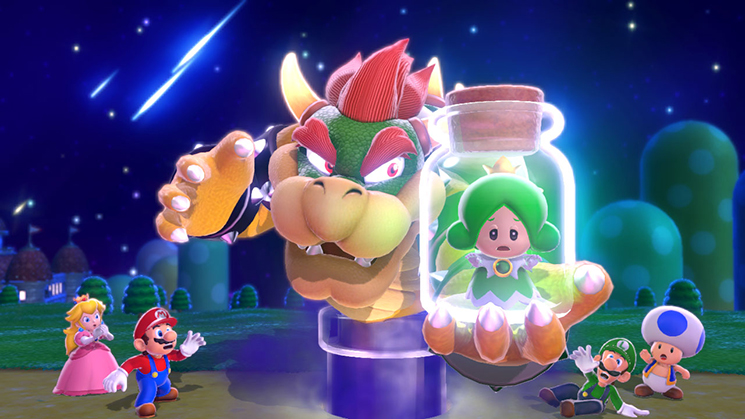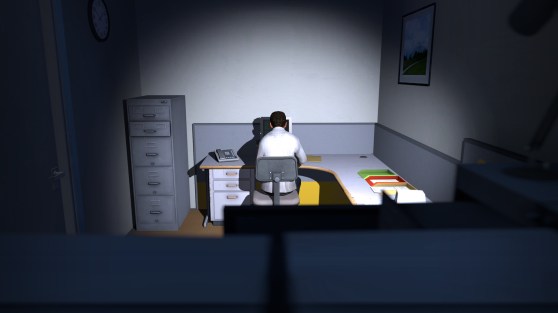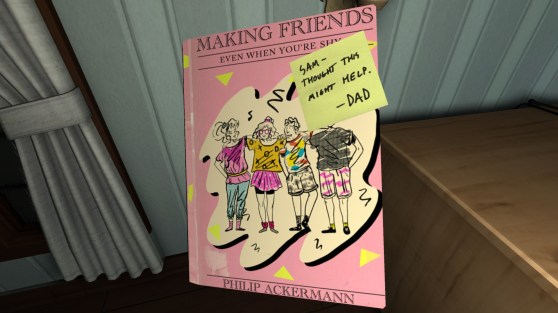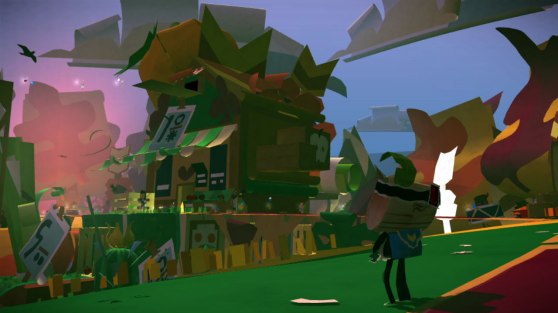Writer Gavin Greene
Game of the Year: The Stanley Parable (PC)
The Stanley Parable is a game that not only affects you while you play it but will alter your syntax when discussing it. This nonlinear exploration of video game narrative is both innately simple and impossible to accurately describe. It’s an adventure game with no puzzles or combat, over in 10 minutes or after a two-hour spiral of glorious insanity. Looking back at everything from reviews of the game to the forums talking about it, you’ll see gamers of all types trip over themselves in their enamored gushing, trying and failing to adopt the breathless dry wit of the mercurial narrator or his sporadic shifts in tone. Guide Stanley through his abandoned office building yourself, and it’s hard not to see what sent everybody to their thesauruses.
The Stanley Parable gave players a constant drip of haughty intellectualism, and we all devoured it with a new-found appetite. Video games are relatively new to the idea of self-reflexivity and deconstructionism, usually not prone to examinations of their own design outside of snarky meta commentary. But The Stanley Parable used any excuse to shine light on its own behind-the-scenes mechanics. It had an comeback for almost every action the player could undertake, even taking your hand off the mouse and leaving Stanley motionless in a room. Even the achievements are a parody of the idea of gratuitous player reinforcement. But this isn’t just an experience for the game snobs. The constant visual absurdities are enough to draw in anyone who fought against a designer’s forced perspective of how they should progress.
The Stanley Parable takes some of the best parts of the Portal franchise, amps them up until the feedback is screaming out the speakers, and refuses to let you stop laughing. It’s a truly unique adventure and hopefully the start of something new and wonderful.
Runner-up #1: Papers, Please
Runner-up #2: The Last of Us
Writer and editor Jay Henningsen
Game of the Year: Gone Home (PC)
Some shortsighted hardcore gamers have derided Gone Home for its lack of challenge of any sort. Some even claim that it’s not even a game. The Fullbright Company, however, has artfully proven that storytelling and simple, human curiosity can be just as compelling as the carrot-on-a-stick machinery of unlockables and multiplayer ladders.
Before you write off Gone Home as some artsy-fartsy experiment, ask yourself if any other game you’ve ever played elicited a range of emotions such as sorrow, dread, loneliness, apprehension, joy, fright, and anger. What other game lets you explore the intimate details of an entire family in such a way that is almost guaranteed to touch you on some personal level?
Amidst a sea of multiplayer shooters, open-world adventures, and regurgitated sports titles, Gone Home stands out as one of the truly unique experiences of the year — one that I’m not hesitant to recommend to anyone.
Runner-up #1: State of Decay
Runner-up #2: BioShock: Infinite
Writer Evan Killham
Game of the Year: Tearaway (PlayStation Vita)
I know a lot of people are picking Naughty Dog’s grim-fest The Last of Us, and that’s a fine game all around, but I had a problem with it: It wasn’t fun. And it’s not just me; pretty much everyone I know said they could only play it for so long before they had to stop from exhaustion.
And that has a place in art, sure, but in a year that was full of so much cynicism and bleakitude, a game that celebrates fun and childlike innocence was a welcome change. So my pick is Tearaway, a game from the makers of LittleBigPlanet that manages to fix the earlier title’s severe gap between being creative and actually playing the game. Media Molecule went ahead and made the world in a charming papercraft style and then lets players add their own personal flair by doing things like drawing the snowflakes that will fall at one point and making a crown for an embattled Squirrel King.
To play Tearaway is to participate in its world, and I couldn’t put it down because it gave me such a sense of ownership over the setting and little bits that were truly and uniquely my own. I don’t think I’ve ever been less ashamed to be caught playing a “cute” game.
Plus, my squirrel crown was completely awesome.
Runner-up #1: BioShock: Infinite
Runner-up #2: Assassin’s Creed IV
Writer and editor Eduardo Moutinho
Game of the Year: The Last of Us
Runner-up #1: Grand Theft Auto V (multiplatform)
I am one of the few people who felt that Grand Theft Auto IV wasn’t the pinnacle for Rockstar Games’ open-world crime franchise. While I enjoyed the most recent foray into the gritty, New York-inspired streets of Liberty City, I didn’t agree with GTA IV’s overly focused, more intimate direction. I yearned for an expansive world — one that would provide me with a mind-boggling number of ways to cause mayhem.
Grand Theft Auto V gave me that sadistic sandbox.
The game’s San Andreas setting is huge. You can stage some urban ruckus in a tank. Then, you can lose the cops as you drive your way up a mountain. And, just because, you can grab a dirt bike, speed off a cliff, and base-jump your way down to the beach. If that’s not enough, you can hop into a submarine and explore the sea floor — or scuba dive and have an up-close encounter with a coral reef.
And that’s only a fraction of what you can do.
Oh, and did I mention that GTA V’s single-player campaign has three playable protagonists and a meaty, interwoven narrative centered on enormously entertaining heists? Or that the title has a robust online mode that keeps the madness going once you’re done with the solo missions?
GTA V is massive, diverse, crazy, funny, shocking, and surprising. Most importantly, it’s a lot of fun. It’s everything a Grand Theft Auto should be.
That’s why it’s one of my favorite games from 2013.
Runner-up #2: BioShock: Infinite
Writer Giancarlo Valdes
Game of the Year: The Last of Us
Runner-up #1: Tearaway
Runner-up #2: Brothers: A Tale of Two Sons (multiplatform)
One of the most remarkable aspects of Brothers: A Tale of Two Sons — and the reason it bumped off my original No. 3 pick (the excellent shooter Metro: Last Light) — is the ingenious way it uses your controller to tell its story. At first, the unorthodox setup — the left analog stick controls the eldest child while the right moves the youngest — seems like a gimmick. But it quickly becomes integral to the experience as you time the brothers’ movements to solve puzzles and to traverse through the game’s strange but beautiful landscape.
And by the end of the two-to-three hour adventure, Brothers takes another surprising turn: It strips away its fairy-tale-like trappings in favor of something much more profound and intimate. I couldn’t stop thinking about it for days.
VentureBeat's mission is to be a digital town square for technical decision-makers to gain knowledge about transformative enterprise technology and transact. Learn More






